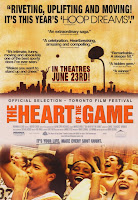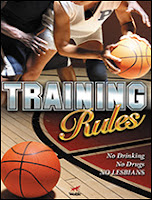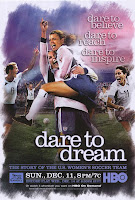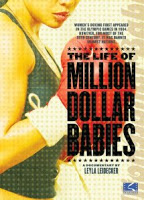 The Life of Million Dollar Babies (aka Golden Gloves), 2007. Directed by Leyla Leidecker
The Life of Million Dollar Babies (aka Golden Gloves), 2007. Directed by Leyla Leidecker
The Golden Gloves competition is the most storied amateur boxing tournament in the U.S. More than any other sport, however, boxing has been a true boys’ club, and an unspoken tradition barred females from entering since its inception in the 1920s. A new round of equality began in the mid-90s when a streetwise Brooklyn female pugilist named Dee Hamaguchi joined forces with the ACLU and pried the door of bias ever-so-slightly open.
Through a narrative pattern we often see in sports docs, we follow eight hopefuls striving for their personal bests as they keep their eyes on the prize of the 2005 finals in Madison Square Garden.
The Life of Million Dollar Babies is a powerful window upon the friction athletes often face not only on the field of gender, but also race and class. While male boxers are funded by the USA Boxing League, a technicality disqualifies females from financial support. When we witness the winner of the climactic quarter finals, a brassy Puerto Rican unable to go on to the finals simply because she can’t pay for it, we can’t help but feel the sting of social inequality.
 The Heart of the Game, 2005. Directed by Ward Serrill
The Heart of the Game, 2005. Directed by Ward Serrill
Perhaps a female-oriented cousin of the classic documentary Hoop Dreams, The Heart of the Game is at its core about the inspiring, unlikely relationship between African-American basketball player Darnellia Russell and tax lawyer-turned-coach Bill Rensler.
Russell’s remarkable journey begins with her struggle for identity at an almost exclusively white, privileged high school, plunges into her unexpected motherhood and the complications of being a teen mom and athlete, and climaxes with her graduation from high school and garnering of her region’s Player of the Year Award.
A movie as much about growing up as about sports, this gem will uplift anyone with a heart … and with its shoestring budget of $11,000, it’s a testament to the possibilities of independent filmmaking.
 Unmatched, 2010. Directed by Nancy Stern Winters and Lisa Lax
Unmatched, 2010. Directed by Nancy Stern Winters and Lisa Lax
A standout episode of ESPN’s ongoing 30 for 30 documentary series, Unmatched is a deftly-edited wealth of candid interviews that plays out like an epic clash of the titans. From their inauspicious entrance onto the women’s tennis scene in the early 1970s to their elevation to sports icons, Chris Evert and Martina Navratilova are bared to the audience in an intimate portrait of ardent competition and mounting admiration that matures across a span of over 80 fiery matches.
As a nuanced essay on the complex relationships obtained through time-ripened sports rivalries, this feature is truly “unmatched,” and along the way sketches the seismic shifts that have defined women’s tennis throughout the decades.
 Training Rules, 2009. Directed by Dee Mosbacher and Fawn Yacker
Training Rules, 2009. Directed by Dee Mosbacher and Fawn Yacker
Subtitled “No Drinking, No Drugs, No Lesbians,” the short, bittersweet Training Rules is an expose of another front on which female athletes face prejudice: discrimination based on sexual orientation.
Made as a political consciousness-raiser by a lesbian activist and a psychiatrist, Training Rules brings to light the paranoiac witch-hunting atmosphere that pervades Penn State’s women’s basketball team. (In light of the notorious sex abuse scandal that rocked that school’s football team, the film is a doubly potent indictment of hypocrisy and double standards.) By focusing on the especially tragic case of Jennifer Harris, a promising hoop-star whose career was crushed by bigotry, Training Rules makes the pain of discrimination personal and impossible to ignore.
 Dare to Dream: The Story of the U.S. Women’s Soccer Team, 2005. Directed by Ouisie Shapiro
Dare to Dream: The Story of the U.S. Women’s Soccer Team, 2005. Directed by Ouisie Shapiro
As with several of the docs already mentioned, Dare to Dream is not just about the struggle of individuals’ struggles for acceptance but also the grueling journey toward legitimacy within a particular sport. Over the course of the film’s duration, we get to know pioneering players Brandi Chastain, Mia Hamm, Julie Foudy, and Joy Fawcett, as well as the sweat and devotion they invested into making a once laughed-at franchise an Olympic spectacle.
All of these films are as packed with joy and pain as any glossy Hollywood product, and through the passions of their filmmakers, convey a sense of humanity few fiction flicks can compete with. By taking us through the lows as well as the highs, the crushing defeats as well as the delirious triumphs, these films inspire us by capturing the ineffable richness of sports and even life itself.
